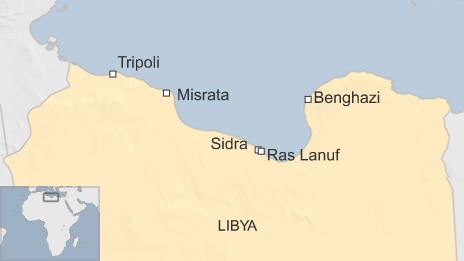Libya airstrikes hit Misrata militants for first time
- Published

Libya's air force has struck the western city of Misrata for the first time in the latest clash between government and militant forces.
A Misrata source confirmed the strikes to the BBC, adding that there were no casualties or material damage.
The airstrikes come after a 72-hour ultimatum issued by the air force to militants based in Misrata.
The Misrata-led Libya Dawn militia alliance controls much of western Libya, including the capital, Tripoli.
The government has been pushed back into eastern areas.
Libya has been plagued by instability and infighting since the toppling of Colonel Muammar Gaddafi in 2011, and violence has been steadily increasing in recent months.
'High spirits'
The bombings came after militants had attacked the eastern oil ports of Sidra and Ras Lanuf.
Militants were "still in high spirits, and [the] bombings will not affect our resolve," the Misrata source told the BBC.
He said there were two air raids, which hit an air force academy near the airport and an area near the sea port and steel factory.
An attack on a power plant in the Libyan city of Sirte on 25 December left at least 19 soldiers dead.
Libyan military sources said Libya Dawn, which includes some Islamist armed groups, was responsible for the attack.
In a separate incident, an oil tank at Libya's largest oil export terminal in Sidra caught fire when it was struck by a rocket during fighting on Saturday.
That attack, and the fight for control of Ras Lanuf, prompted the air force to issue its ultimatum.
The United Nations mission to Libya has been trying to schedule talks between the key players of warring sides for nearly a month.
The talks have been postponed twice in recent weeks and are now scheduled to take place on 5 January.
The BBC's Rana Jawad in Tripoli says it is still not clear if they will go ahead.
She says the prospects for any negotiations get dimmer by the day, as the fighting on the ground and the rhetoric from both sides escalate.